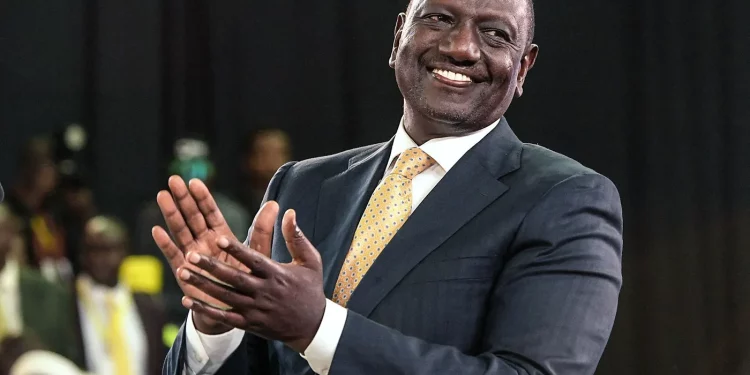In a recent ruling by Kenya’s high court, a government plan to deploy hundreds of police officers to lead a UN-backed multinational mission in Haiti has been deemed unconstitutional, illegal, and invalid.
Judge Enock Chacha Mwita emphasized that any decision to send police officers to Haiti without parliamentary approval violates the constitution and the law.
This decision comes after the UN Security Council approved the Kenya-led mission, which faced domestic criticism and a legal challenge by the opposition Thirdway Alliance.
However, while the court ruled against the deployment, the primary issues raised during the case were not the deciding factors. The judgment leaves the multinational mission in limbo, signalling a setback for the Kenyan government’s ambitions.
The controversy surrounding the Kenyan deployment highlights the complexities of foreign intervention in the face of escalating gang violence and instability in Haiti.
Critics argue that the Kenyan government’s decision to involve itself in foreign affairs neglects pressing issues within its own borders. This critique gains traction considering Kenya’s historical challenges and the unresolved problems faced by Kenyan citizens, both home and abroad.
The legal challenge against the deployment questioned the government’s procedure in obtaining international approval before securing parliamentary backing.
Constitutional lawyers and opposition parliamentarians expressed concerns about the lack of transparency and accountability in this process. The court ruling acknowledged that parliamentary approval was not required for police deployments, but it stressed the necessity of a reciprocal arrangement with the host government – an element missing in this case.
The judge’s decision to declare the deployment “illegal” not only impacts the Kenyan government’s immediate plans but also raises questions about the rationale behind such a mission. The ruling suggests that the government may not have adequately addressed key diplomatic aspects, leaving the entire multinational mission in a state of uncertainty.
Beyond legal intricacies, the critique extends to the broader context of Kenya’s involvement in international affairs while grappling with its own challenges. Kenya has faced political, economic, and security issues domestically, including a surge in crime, political tensions, and economic disparities.
Critics argue that diverting resources and attention to a foreign mission may be a misplaced priority, especially when the country itself is dealing with internal crises.
In addition to the domestic concerns, the decision to deploy Kenyan police to Haiti has sparked controversy due to the human rights record of the Kenyan police force.
Rights groups have expressed reservations about the force’s ability to handle complex security threats and its questionable track record on human rights issues.
Observers have raised doubts about Kenya’s preparedness to address challenges such as sophisticated criminal gangs and the potential for human rights abuses during the mission.
Haiti’s plea for urgent intervention at the UN Security Council, emphasizing the barbaric levels of violence in the country, underscores the severity of the situation.
The assassination of President Jovenel Moïse in 2021 triggered a descent into chaos, marked by increasing gang violence and lawlessness.
The UN’s special representative for Haiti reported a staggering 122% surge in people violently targeted by gangs in 2023, with thousands killed and kidnapped, leading to a humanitarian crisis.
However, while the need for intervention is evident, the Kenyan government’s involvement raises eyebrows. Haiti’s security forces are struggling against armed gangs controlling significant portions of the country, with police losing thousands of officers in recent years.
The deployment of a foreign task force is seen as crucial, but concerns linger about the tact and preparedness of the mission, especially considering Haiti’s historical scepticism toward foreign interventions.
Moreover, the criticism extends to the broader issue of foreign intervention in Haiti. The UN’s checkered history in the country, including instances of sexual abuse by peacekeepers and the introduction of cholera, has fuelled scepticism about the effectiveness and impact of external involvement.
Many argue that, given Haiti’s troubled past with foreign intervention, careful considerations must be made to avoid repeating historical mistakes.
The Kenyan government’s interest in leading this mission remains unclear, with speculation ranging from attempts to bolster the nation’s international profile to serving as a proxy for Western allies, notably the United States. Financial gains from the mission, with the US pledging substantial support, add another layer of complexity to Kenya’s involvement.
In conclusion, the Kenyan government’s decision to deploy police officers to Haiti has been met with legal challenges, domestic criticism, and international skepticism.
The high court’s ruling against the deployment not only underscores legal intricacies but also prompts a critical examination of Kenya’s priorities and capabilities in addressing both internal and external challenges.
The debate over the appropriateness of such a mission, considering Kenya’s own unresolved issues, raises fundamental questions about the motivations behind foreign interventions and the need for a nuanced and strategic approach to global problem-solving.
For any enquiries please, email our editorial team at [email protected]. If you liked this story, kindly sign up for Clariform Newsletter, a handpicked selection of stories that helps you clarify things that matter and gives you clear signals about your world, delivered directly to your inbox.
Please subscribe to our YouTube channel, and join thousands of Clariform on Facebook, Twitter and Instagram.












